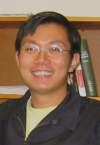Ming Zhao
Distributed computing, Virtualization, High-performance systems, Autonomic computing, and Operating systems. Research InterestsDr. Zhao’s research is in the areas of computer systems, with a focus on distributed/grid computing, virtualization, high-performance systems, and autonomic computing. He is particularly interested in addressing the challenging problems of data and resource management in large-scale systems, as well as the interdisciplinary studies which bridge computer systems research and other domains such as computational sciences. Today's large distributed applications require tremendous amounts of data and resources, supported by computer systems with increasing scale, complexity, and dynamism. It is often difficult to make effective use of resources and execute applications with desired quality-of-service in such environments. His goal is to explore novel data and resource management solutions, using grid, virtualization and autonomic techniques, to provide high-performance, robust, and secure computing. More information, including current research projects and recent publications can be found at: http://www.cis.fiu.edu/~zhaom |
"PIRE... provides our students with the kind of
direct international experience and training that will
prepare them for careers in an increasingly competitive
global arena." "PIRE...will enable the next generation of
students participants to become fully engaged as members of
the globally-aware IT workforce."" "We look forward to hosting students researchers
... to foster our existing collaborations and create new
ones." "I was able to develop quite a bit as a person, researcher, and professional." "Being able to learn elements directly related to my project, the likes and dislikes of another culture, and be able to communicate in a different language are all aspects related to the PIRE program for which I will always be grateful." "It helps you build confidence that the degree you hold will enable you to tackle any problem, and, more importantly, it lets you experience the job before committing your life to it." |

This material is based in part upon work supported by the National Science Foundation under Grant Number OISE-0730065. Any opinions, findings, and conclusions or recommendations expressed in this material are those of the author(s) and do not necessarily reflect the views of the National Science Foundation. © 2007 Florida International University





